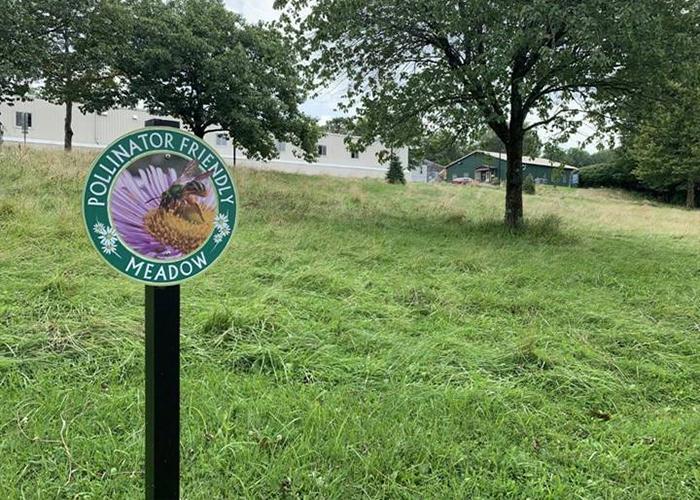STONE RIDGE – Cornell Cooperative Extension Ulster County is creating a pollinator-friendly meadow on the SUNY Ulster campus to provide habitat for bees and other pollinators that are under increasing environmental stress due to pesticides, industrial agriculture and climate change.
“Ninety percent of flowers and the plants we eat are pollinated by bees, beetles, moths, flies, bats and birds,” said Dona Crawford, who coordinates Cornell’s Master Gardener Program in Ulster County. “This is an experiment to see if we can support and sustain these pollinators by letting a swath of lawn revert to a natural state. If we’re successful, we can demonstrate to homeowners and farmers that with very little effort they can restore some of the biodiversity that we’ve lost.”
How little effort? At SUNY Ulster, the college’s maintenance crew stopped mowing a 210-by-60-foot area of lawn that Cornell master gardener volunteers had marked off with orange spray paint. What will become a 12,600-square-foot meadow will be mowed once every year or two.
This win-win decrease in lawn moving saves the college labor and fuel costs, while trimming carbon dioxide emissions, stabilizing the soil, reducing erosion and slowing storm water runoff.
Here’s the rest of the minimal effort: This fall, the master gardeners will scratch the soil’s surface to plant native seeds that need a cold period to germinate, like mountain mint, Joe Pye weed, types of milkweed and giant coneflower. The Hudson Valley Seed Company donated the seeds.
“The college site formally was an orchard, so it may or may not have an existing seed bank which will yield native plants over time. We are expecting to see mostly grasses in the first year, with some pockets of flowers,” Crawford said. “We hope to attract ground-nesting pollinators and birds.” This is a “see what happens” project, she said. By the third year, the gardeners expect more plants and maybe small shrubs. In five to 10 years, there may be trees. Meanwhile, they expect to cut a path through the meadow, so people can wander through.
The idea for creating the meadow arose after a SUNY New Paltz instructor, Laura Wyeth (’18) who had received a Cooperative Extension scholarship for environmental biology invited the gardeners to her campus. Laura had been instrumental in creating a pollinator meadow there, which resulted in SUNY New Paltz being certified as bee-friendly campus.
“We were impressed with the simple beauty of that meadow, and since we’re always talking to people about doing something with their land other than lawns, we saw it as a great example of what can happen when you don’t mow,” Crawford said.
Visitors can see the beginnings of the new meadow at SUNY Ulster on the left of the main campus road just before the traffic circle. It arcs behind Cornell’s Xeriscape (or dry) garden, a long-established and much-visited garden with native plants that do not need to be watered.
People with gardening questions can phone or visit the Cornell Cooperative Extension office at 232 Plaza Road in Kingston. Calls to the Horticulture Hotline (845-340-3478) can be made at any time, but will be returned only when Master Gardener volunteers are there on Mondays, Wednesdays and Fridays from 9:00 a.m. to 12:00 p.m. until Nov. 1 when the hours change to Friday only, 9:00 a.m. to 12:00 p.m.
For information about Cornell Cooperative Extension of Ulster County’s community programs and events go to ulster.cce.cornell.edu/.








